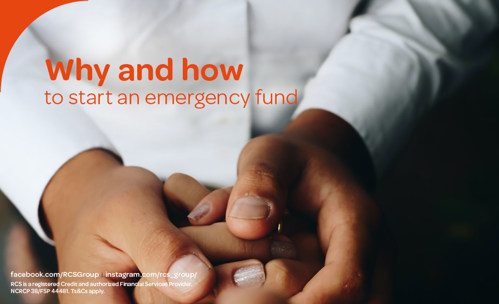Why and how you should start an emergency fund
11 AUGUST 2023
We’ve been told that putting away money each month is a good habit to adopt as it builds reserves for when we might unexpectedly need it. Emergency funds are a simple solution to saving methods, learn more in this article.
What is an emergency fund?
An emergency fund is exactly what the name says, a fund that you set up to cater to cover emergencies. These are unexpected costs such as medical bills, home and car repairs, or sudden unemployment. Suddenly your car is failing you or your home needs drastic maintenance. It is best to have a fund for these circumstances so that you avoid using your savings or using credit to pay them which could lead to debt. An emergency fund acts as a safety net for your finances, to avoid setbacks or negative effects.
Why should you have an emergency fund?
Emergency funds are not only used for unexpected medical or home costs, it can also supplement your day-to-day finance management where you need extra support without having to take out a loan. Here’s why you should have an emergency fund;
Avoid more debt
When we experience financial shortfalls, our first instinct is to take out a loan to help us. An emergency fund will encourage you to use your own allocated funds for things that you hadn’t budgeted for. This will help you avoid taking out more debt while also enabling you to pay off your debt repayments as scheduled if you have them.
Cushion the start of your budgeting process
The initial stages of starting to budget can be a little difficult as you need to start keeping a tighter purse than you usually do. Having an emergency fund can ease these initial growing pains and expenses that you had not planned for.
You need to supplement your income
With only one source of income, accounting for unexpected losses or costs isn’t as easy if you have more streams of money that are coming in. If you are the only breadwinner, an emergency fund is crucial if you find yourself unable to work when you suddenly fall ill or get injured. Aim to have a year’s worth of expenses covered with your emergency fund and a income protection plan for unforseen events.
You are self-employed
As a self-employed contractor, you do not benefit from the unemployment benefits received by salaried employees. Which means that you will stop receiving an income when you cannot work. Use an emergency fund to cover your expenses until you recover.
You are a homeowner
Owning a home is an ongoing expense that can set your finances back if you aren’t prepared for them. Housing repairs and upkeep can happen when you least expect them and can influence your standard of living. Within your emergency fund, allocate a portion specifically for home expenses so that you have a backup plan.
You live away from family or work a long-distance away
Traveling between your family, home or work can rack up large expenses because of last-minute airline tickets and accommodation costs. Take into consideration the possibility of medical emergencies or funerals and how much these last-minute bookings will cost.
You have a chronic medical condition
Continuous hospital visits or routine treatments could have you taking unpaid sick leave, and affect how you manage your expenses. An emergency fund can help you manage these situations and ensure that your finances are not affected.
You have a goal to save towards
When you’re saving up towards a house or starting your own business, an unexpected expense shouldn’t have to set your savings back. Instead, use an emergency fund to cover other expenses and to stay on track with your financial goals.
How much should you have in your emergency fund?
The amount you put away in your emergency fund depends on how much income you have available and how possible it is you might need an emergency fund, i.e. if you and your household are susceptible to risks or sudden expenses.
The general amount you should have saved away is at least 3 month’s expenses if you are not the sole breadwinner and if you have a stable income. This means that your emergency fund will consist of 3 month’s income. However, if you are the only breadwinner or if you are single, living away from home and self-employed, a six-month emergency fund is advisable.
What is a rainy-day fund?
Rainy-day funds are usually set aside to cover smaller, one-off expenses such as paying for an emergency root canal or an important weekend away. It is used in place of credit card purchases or short-term loans. Emergency funds are catered for larger unexpected costs, so having a rainy-day fund as well would be an advantage.
How to start an emergency fund?
- Track your monthly income and expenses including any debt payments you need to make or other recurring expenses.
- Set your emergency fund goal amount by deciding how much month’s income you will need to feel secure and will cover your expenses in the long-term.
- Create a savings plan and determine how much you can afford to put away each month to reach your goal.
- Make your emergency fund easy to access and automate your deposits.
- Stick to your plan and review how you can maximize your savings where you can, to increase your emergency fund goal if possible.
Where to save your emergency fund?
The best place to keep your emergency fund is in a high-yield savings account. This will ensure that you earn interest on your deposits with no other fees. You could also save your emergency fund in a money market account with your local bank, just be aware of fees that could minimise your returns. An emergency fund should be accessible and allow you to easily withdraw or deposit. To determine what type of account will be best suited to you, research and compare their different fees and features.
The advantages of having an emergency fund have been apparent this year. You never know when you might need to cover certain medical expenses or loss of income. Prepare your financial situation and create a safety net for the upcoming years so that you’re not caught off guard.
MORE ARTICLES ABOUT
RELATED ARTICLES

Education
28 AUGUST 2025
SA Research: How Parents Impact a Child’s Financial Intelligence

Education
12 JUNE 2025
Cultivating Tomorrow's Leaders: Equipping Young South Africans for Life’s Challenges

Education
28 MARCH 2025
